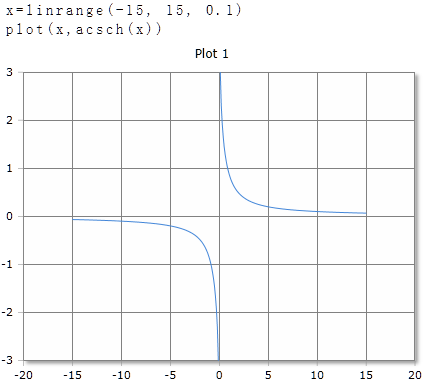ACsch Function
Calculates the inverse hyperbolic edge of the kose
Description
The function \(ACsch\) calculates the inverse hyperbolic edge of the argument.
\(ACsch\) returns the angle to the hyperbolic edge of real or complex numbers. The argument can be a single number or a data field. In the case of data fields, the inverse hyperbolic edge of each individual element is calculated and the results are returned in a data field of the same size.
ACsch for real numbers
Parameter
The argument can be a positive or negative number. At 0, the result returned is ∞ (infinity).
Result
The result is given in degrees (full circle = 360 °) or radians / radians (full circle = 2 · π). The unit of measurement used is set in the toolbar with the DEG or RAD buttons or an optional parameter. The setting in the toolbar applies to the entire worksheet.
Optional Parameter
Optionally, a second parameter can be specified with the keywords DEG or RAD to set the unit of measure for this function call. The specification of the parameter has priority over the global setting in the toolbar. You can use it on a worksheet different functions use different units of measurement independent of the presetting in the toolbar.
Syntax
ACsch(value)
ACsch(value, RAD)
ACsch(value, DEG)
Example
ACsch for complex numbers
For complex numbers, the result is always given as radians, regardless of the default setting in the toolbar. The result is also a complex number.
Syntax
ACsch (re + im)
Example
ACsch(3 + 4i)= 0.121-0.16i
|
|
